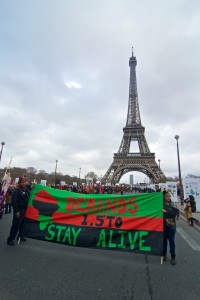COP21 Fallout: What do we want? Climate justice….possibly.

Images for this piece were provided by Eoin Campbell. January 29th 2016
The dust has settled on December’s COP21 Paris conference, where 196 countries signed a landmark agreement to act on Climate Change, and all eyes are now on our own leaders who have ambitious commitments to honour. But does the agreement really tie our leaders down to taking any meaningful action?
Recent commentary from members of Cap Global Carbon, a proposal co-developed by Irish based international think tank FEASTA (foundation for the economics of sustainability), suggests that the agreement is over-reliant on voluntary action and that developing nations are not sufficiently supported in the text.
The first piece, from Robert Hutchison, is complementary of the achievement of actually reaching an agreement between so many nations, but warns that there is no obligation on leaders to take the necessary level of action. His worrying analysis that not enough finance has been committed for mitigation, adaptation or ‘loss and damage’ hammers home the injustice of climate change, whereby those who have contributed least to causing the problem are those who suffer most.
[x_button shape=”square” size=”regular” float=”none” href=”http://www.capglobalcarbon.org/2015/12/15/not-a-fair-copa-report-from-paris-by-robert-hutchison/” info=”none” info_place=”top” info_trigger=”hover”]Click to Read Robert Hutchison’s Analysis[/x_button]
In Mike Sandler’s take, he is firm on the urgency of choosing a path to reduce global emissions, highlighting that business as usual would leave us with 3.7° of warming by 2100, based on the intended emission cuts presented by the participating nations. He warns of the empty promises of corporate greenwashing and the dangers of wasting time hoping for a technological fix. Sandler’s greatest hope lies in setting a realistic and effective carbon price that targets polluters, and the establishment of a global carbon budget in line with annual carbon limits and minimum reduction rates as recommended by climate scientists. Indeed, the goal of Cap Global Carbon is to reduce global carbon by these means, and to redistribute the revenue from the scheme to tackle global poverty and inequality.
[x_button shape=”square” size=”regular” float=”none” href=”http://www.capglobalcarbon.org/2015/12/20/the-forks-in-the-road-after-the-paris-agreement/” info=”none” info_place=”top” info_trigger=”hover”]Click to read Mike Sandler’s Analysis [/x_button]
The final breakdown from Cap Global Carbon compares the scenes of Paris negotiators celebrating the agreement to the Christmas Truce in WW1, shortly after which the peace was broken and the sides returned to pursuing their own agendas, like subsidising fossil fuels and spending hundreds of millions on national defences. For Caroline Whyte, the issue of narrowing the divide between rich and poor nations, reflected in the decoration of their stands at COP21, is the other side of the climate change coin. When the moment of Paris has passed, Whyte asks, will the brief mentions of equity and Climate justice in the agreement be enough to stimulate a just transition to a sustainable world?
[x_button shape=”square” size=”regular” float=”none” href=”http://www.capglobalcarbon.org/2015/12/14/the-paris-agreement-a-christmas-truce-or-a-new-beginning/” info=”none” info_place=”top” info_trigger=”hover”]Click to read Caroline Whyte’s Analysis[/x_button]
[x_author title=”About the Author”]








